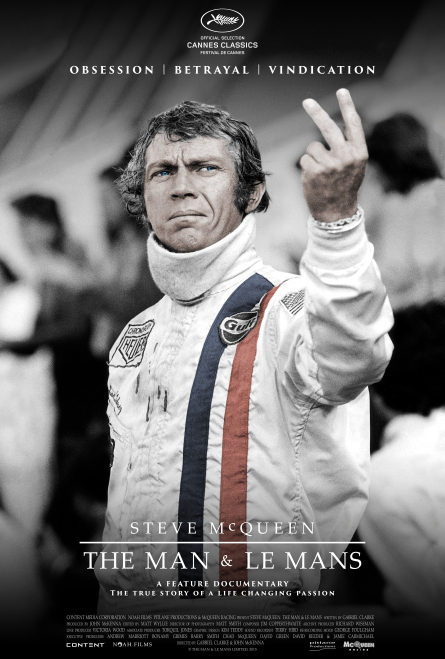‘Steve McQueen: The Man & Le Mans’ Wanders the Same Road as the Film that Inspired It
According to “Le Mans” assistant director Les Sheldon, “You got [sic] motor racing and you got [sic] Steve McQueen — what have you got? You’ve got everything.” Unfortunately, they didn’t have a working script. “Steve McQueen: The Man & Le Mans” makes a point of stating that this isn’t necessarily an impediment in Hollywood, with scripts sometimes being developed as filming continues. But we’ll return to this in a bit.
Most are unaware that “Le Mans” was Steve McQueen’s second racing film. It’s probably because it was the first one that actually got made. And depending on whom you ask, that fate and Hollywood’s fickle appetite intervened was either a jackpot or misery for motor sports fans. “The Day of the Champion” was slated for production in mid-1966, but was canceled by Jack Warner (as in Warner Bros.) because he didn’t want his studio making the second film about racing — “Grand Prix” was nearly finished when time came to begin filming “The Day of the Champion.”
Thus, McQueen ended up waiting a few years longer (until 1970) to make his homage to auto racing with many of the guys who were ready to begin work on “The Day of the Champion.” “Steve McQueen: The Man & Le Mans” is the documentary about that process and McQueen’s loss of innocence. Sadly, “Le Mans” cost him his faith in so many around him and the movie business in general.
McQueen flirted with auto and motorcycle racing from the very beginning. And he was naturally gifted, too — finishing on the podium in at least one major event, the Sebring 12-Hours in 1970. But it wasn’t success or vanity that motivated “Le Mans,” it was McQueen’s passion for all things vehicular. According to “Steve McQueen: The Man & Le Mans,” his love of racing and the complete focus required to win are what motivated the film. “Le Mans” was McQueen’s ode to racing. At least it began that way.
Fascinated by the level of performance needed to win a 24-hour race, McQueen had a target. He’d use Le Mans’s famed race to show the world why he loved the sport so much. “We attempted to show in the film, rather than explain it, just to show why a man races.” McQueen meant this literally; he sought a purely sensory approach to filmmaking and was interested in “breaking the film barrier.” But unlike prior films, he wasn’t just an actor. He was also a producer and acted as the de facto director, which eventually strained relations with director John Sturges and producer Bob Relyea.
Additionally, the documentary mentions other stressors acting on McQueen, namely paranoia exacerbated by his friendship with two people murdered by the Charles Manson Gang (and his apparent mention on Manson’s list), as well as his womanizing and the retributory infidelity of his first wife, Neile Adams. But anyone who has watched “Le Mans” knows that the movie is simultaneously beautiful and miserable — as a visual and aural feast it’s spectacular, but as a narrative, well, there simply isn’t one. And this should be the pure thesis of “Steve McQueen: The Man and Le Mans,” rather than chasing peripheral problems.
And failing to recognize that holistically (rather than just pay lip service to it) is the documentary’s fundamental problem. “Le Mans” was finished, but would it have been otherwise had there been a script? I’d argue not. And citing external factors does nothing but confuse and belabor the issue. Certainly they had an impact, but the fundamental problem was that “Le Mans” was unfit for production. “Steve McQueen: The Man & Le Mans” does itself a disservice by not underlining this issue and cutting straight to it.
Ultimately, the studio stripped McQueen of his responsibilities, save the starring role. They replaced the director, too, and many of the writers were fired or quit. It was released to mediocre reviews and flopped in the box office. It took months longer than planned and was about 30 percent over budget when finished. For McQueen, it meant the end of friendships, his first marriage and, perhaps most importantly, the project he most cared for.
One word repeats throughout “Steve McQueen: The Man & Le Mans”: ego. And you have to wonder if “Le Mans” was made four years earlier whether ego would have been such an issue. Perhaps the principals wouldn’t have been so arrogant. Properly, “Steve McQueen: The Man & Le Mans” doesn’t speculate, as it wouldn’t matter.
Also to the documentary’s credit, racer David Piper’s horrific wreck is examined. Furthermore, it makes a concrete connection between the necessity for multiple takes covering any potential ending (because a firm script didn’t exist) and Piper’s accident. But the film makes an overemphasized point of providing evidence of McQueen’s magnanimity (he wrote letters asking the studio to donate the premier’s proceeds to Piper).
The examination of one stressor that is completely absent however, is substance abuse. It seems odd to mention Charles Manson and not McQueen’s allegedly serious drug and alcohol problem, which if true must have impacted production. But true or false, it should have been explored and proven, either way. Such is reality when a documentary is so close to its subject matter (son Chad McQueen is an executive producer).
Still, there is much to like in “Steve McQueen: The Man & Le Mans” for the McQueen, “Le Mans” and 24 Hours of Le Mans fan, including many first-person accounts from all perspectives. It’s a peek into a passionate, careening production and includes trivia that this fan was previously unaware of. Overall, “Steve McQueen: The Man & Le Mans” underscores what a simultaneous triumph and failure McQueen’s opus was.


